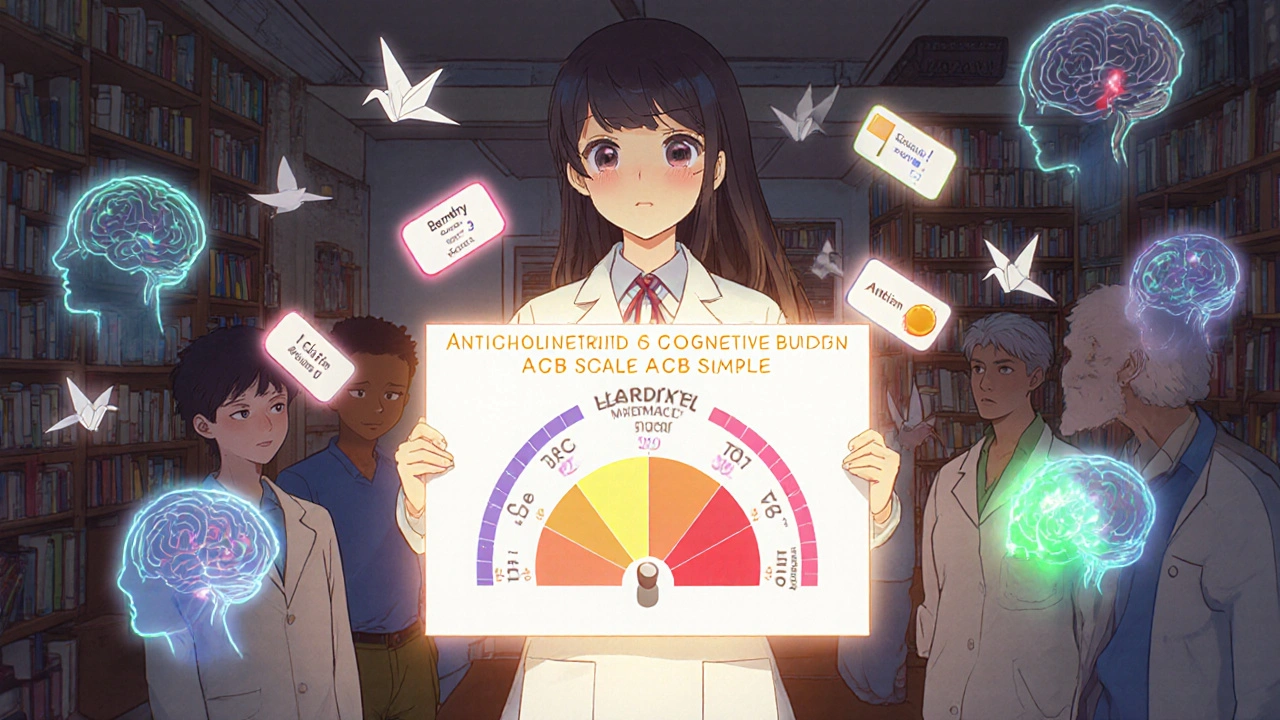
Anticholinergic Burden Calculator
This tool calculates your anticholinergic burden using the Anticholinergic Cognitive Burden (ACB) scale. The higher your score, the greater your risk of memory problems and brain fog from medications.
Your score will appear here based on the medications you add.
Ever had one of those days where you walk into a room and forget why? Or stare at your phone, unable to remember who you were texting? If you’ve been taking any kind of prescription or over-the-counter medicine lately, it might not be stress or aging-it could be your pills.
Brain fog from medication isn’t rare. In fact, about 30% of older adults experience it. But it’s happening to younger people too-especially those on sleep aids, painkillers, or even allergy meds. The good news? Unlike dementia or Alzheimer’s, this kind of memory trouble usually goes away once you stop or switch the drug.
What’s Really Causing Your Brain Fog?
It’s not just one drug. It’s a whole group of medicines that mess with how your brain sends signals. The biggest culprits? Anticholinergics and benzodiazepines.
Anticholinergic drugs block acetylcholine, a chemical your brain needs to form memories. Common ones include:
- Diphenhydramine (Benadryl, Tylenol PM)
- Oxybutynin (Ditropan) for bladder control
- Amitriptyline (Elavil), a tricyclic antidepressant
- Some stomach meds like hyoscine
Research shows people using these drugs have up to a 4.2-fold higher risk of memory problems compared to those who don’t. Even worse, regular use of diphenhydramine over seven years increases dementia risk by 54%.
Benzodiazepines like Xanax and sleep pills like Ambien work differently. They calm your brain by boosting GABA, a calming neurotransmitter. But that same effect shuts down the hippocampus-the part of your brain that turns short-term memories into long-term ones. Studies using fMRI show these drugs can reduce memory transfer by 30%. Ambien users report memory gaps in 15% of cases-way more than older benzodiazepines like lorazepam.
Other Surprising Offenders
It’s not just sleep and allergy meds. Painkillers, antidepressants, and even cancer drugs can fog your mind.
Opioids like oxycodone and hydrocodone affect memory consolidation. At normal doses, they can cut your working memory capacity by 25%. And it’s not just the dose-it’s the form. Immediate-release versions cause 20-30% more cognitive disruption than extended-release ones.
Chemotherapy doesn’t just kill cancer cells-it can mess with your brain. About 75% of cancer patients develop what’s called “chemo brain.” Symptoms include trouble focusing, forgetting names, and losing your train of thought. For 35% of them, these issues last months or even years after treatment ends.
Even statins-drugs meant to lower cholesterol-have been blamed. But here’s the twist: large studies show no real difference in memory between statin users and placebo groups. The few reports of brain fog are likely rare side effects, not the norm.
And then there’s prednisone. Corticosteroids like this can trigger sudden confusion, mood swings, and memory lapses-especially at doses over 20mg/day. Symptoms often show up within 3-5 days of starting the drug.

How to Tell If It’s Your Medication
Brain fog from meds has a pattern. It usually starts soon after you begin a new drug-sometimes within hours or days. It’s not gradual like Alzheimer’s. It’s sudden. And it often improves when you stop taking the drug.
Ask yourself:
- Did the fog start after I began a new pill?
- Do I feel clearer on days I skip my medicine (if safe to do so)?
- Do I have memory gaps after taking sleep aids or painkillers?
- Do I feel drowsy, spaced out, or confused during the day?
One Reddit user, u/MemoryLapse2023, described taking 5mg of Ambien for two weeks and waking up with “complete memory blackouts.” The fog lifted within 72 hours of stopping. That’s not unusual. Over 140 similar stories exist on that thread alone.
A 68-year-old woman in a Pharmacy Times case study started oxybutynin for incontinence and became severely confused. Her memory returned within 10 days of stopping the drug.
And it’s not just older people. AARP’s 2023 survey found that 62% of adults over 50 blamed their memory issues on meds. Sleep aids were top of the list, followed by antihistamines and painkillers.
What to Do Next: A Step-by-Step Plan
If you suspect your meds are causing brain fog, don’t quit cold turkey. Talk to your doctor. But here’s how to prepare for that conversation.
- Write down every pill you take-prescription, OTC, supplements, even herbal teas. Include doses and when you take them.
- Track your symptoms. Note when the fog hits, how bad it is, and if it’s worse after certain meds.
- Check your anticholinergic burden. There’s a tool called the Anticholinergic Cognitive Burden (ACB) scale. Ask your pharmacist if your meds score high. Diphenhydramine? Score of 3 (high). Loratadine? Score of 0 (safe).
- Ask about alternatives. For sleep: try melatonin (0.5-5mg) or trazodone (25-50mg). Both have far less cognitive impact. For allergies: switch from Benadryl to Claritin or Zyrtec.
- Consider timing. If a drug makes you drowsy, take it at night. A Johns Hopkins study found this simple change cut daytime brain fog by 35% in 78% of participants.
Your doctor may suggest a “deprescribing” plan: one drug at a time. If your memory doesn’t improve after two weeks of stopping one, they’ll move to the next. Most people see improvement within 3-14 days.

What’s Changing in Medicine
This isn’t just a patient problem-it’s becoming a medical priority.
Hospitals now use tools like the Drug Burden Index to flag high-risk meds in electronic records. The Beers Criteria, updated every two years, now lists 52 drugs with high anticholinergic risk. Hospitals using these tools have cut medication-related brain fog by 28% in Medicare patients.
The FDA just required all benzodiazepine labels to include warnings about anterograde amnesia. That affects 30 million prescriptions a year in the U.S. alone.
New drugs are coming. Daridorexant, a newer sleep aid in Phase III trials, shows 92% less cognitive impairment than Ambien. And machine learning tools like MedCog can now predict which medication combinations are most likely to cause brain fog-with 89% accuracy.
Future steps? Genetic testing. Some people metabolize drugs slower due to CYP2D6 or CYP2C19 gene variants. That explains why one person gets foggy on a low dose while another doesn’t. The University of Michigan’s 2024 trial showed genetically guided prescribing reduced cognitive side effects by 63% compared to standard care.
And now, Medicare Part D will reimburse pharmacists for cognitive risk assessments starting in 2024. That means more people will get help before the fog sets in.
When to Worry-and When to Relax
Not every memory slip is dangerous. Forgetting where you put your keys? Normal. Forgetting your own birthday? That’s a red flag.
Medication-related brain fog is usually temporary. If you’ve been feeling off since starting a new drug, and your symptoms improve after stopping it, that’s a strong sign the pill was the cause.
But if your memory problems keep getting worse, or you start having trouble recognizing loved ones, navigating familiar places, or managing your finances-those are signs of something deeper. See a neurologist. But first, rule out meds.
The biggest mistake? Assuming it’s just aging. It’s not. You’re not losing your mind-you’re reacting to a chemical. And that reaction can be reversed.
Take action. Talk to your doctor. Review your meds. Ask about alternatives. Your brain will thank you.
Can over-the-counter sleep aids cause memory loss?
Yes. Sleep aids containing diphenhydramine (like Benadryl, Tylenol PM, or Unisom) are strong anticholinergics. They block acetylcholine, a brain chemical needed for memory. Studies show regular use increases dementia risk by 54% over seven years. Even short-term use can cause daytime brain fog and memory gaps. Switch to melatonin or trazodone instead-they’re far safer for your brain.
How long does it take for brain fog to go away after stopping a medication?
It varies. For most people, symptoms start improving within 3-7 days after stopping the drug. Full recovery usually takes 1-2 weeks. Some, especially long-term users of benzodiazepines or anticholinergics, may take up to 4-6 weeks to feel normal again. The NIH found cognitive test scores improved by 15-20% within 4-6 weeks after removing high-risk meds.
Are antidepressants linked to memory problems?
Some are. Tricyclic antidepressants like amitriptyline have strong anticholinergic effects and are linked to a 4.2-fold higher risk of memory disorders. SSRIs like sertraline or escitalopram have much lower risk-only 1.8 times higher than non-users. If you’re on an older antidepressant and notice brain fog, ask your doctor if switching to an SSRI might help.
Can statins cause brain fog?
It’s rare. While some people report memory issues on statins, large studies-including one with over 1,000 participants-found no significant difference in cognitive function between statin users and placebo groups after six months. If you suspect your statin is causing problems, talk to your doctor, but don’t stop taking it without medical advice. The benefits for heart health usually outweigh the small risk of cognitive side effects.
What’s the safest alternative to Ambien for sleep?
Melatonin (0.5-5mg) and trazodone (25-50mg) are the top choices. Melatonin helps regulate your sleep cycle without affecting memory. Trazodone, originally an antidepressant, is commonly used off-label for sleep and has far less cognitive impact than Ambien. Clinical trials show 85% of people see memory-related side effects resolve within two weeks of switching. Newer drugs like daridorexant are also showing promise with 92% less brain fog than zolpidem.
Can chemo brain be reversed?
For many, yes-but not always quickly. About 75% of cancer patients develop chemo brain, with symptoms like trouble focusing and forgetting words. These often start within 1-2 treatment cycles. While some recover fully within months, 35% still have issues over a year after treatment ends. Cognitive rehab, exercise, and sleep hygiene help. There’s no magic pill, but most people improve significantly over time.
Tom Shepherd
November 27, 2025 AT 23:08Jauregui Goudy
November 29, 2025 AT 07:47Kaleigh Scroger
November 29, 2025 AT 14:51shawn monroe
November 29, 2025 AT 15:35Sue Haskett
December 1, 2025 AT 10:32Elizabeth Choi
December 2, 2025 AT 20:48Aishwarya Sivaraj
December 3, 2025 AT 08:45Iives Perl
December 4, 2025 AT 12:21steve stofelano, jr.
December 4, 2025 AT 15:25Savakrit Singh
December 4, 2025 AT 19:50